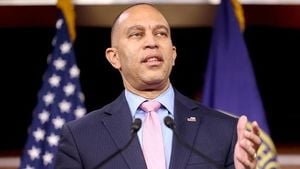In a week marked by legal drama and deepening anxiety among immigrant communities, two major developments have thrown the spotlight back onto the United States' turbulent immigration system under President Donald Trump’s second term. On August 8, 2025, a federal appeals court overturned a lower judge’s order that could have held the Trump administration in contempt for ignoring a judicial ban on deportation flights. Meanwhile, the arrest of Catalina “Xóchitl” Santiago, a DACA recipient and prominent Texas-based activist, has sent shockwaves through the nation’s so-called “dreamer” population, underscoring what advocates call the “greatest threat yet” to the Deferred Action for Childhood Arrivals (DACA) program.
These events, though distinct, are deeply intertwined—each reflecting the heightened tension between the executive branch’s aggressive immigration enforcement and the judiciary’s efforts to uphold due process and protections for vulnerable groups. The result? A climate of fear and uncertainty for hundreds of thousands of immigrants and their supporters, many of whom feel the ground shifting beneath their feet.
The appeals court’s ruling, delivered in a closely split 2-1 decision, undid one of the most forceful judicial rebukes of the Trump administration since his return to office. The case centered on the administration’s use of the Alien Enemies Act to deport Venezuelan men accused of gang membership—a law historically reserved for wartime and rarely invoked in peacetime. In March 2025, U.S. District Judge James Boasberg had ordered a halt to deportation flights, yet two planes carrying about 250 people landed in El Salvador despite his ruling. The administration claimed it was unable to reroute the flights safely and questioned whether Boasberg’s verbal order was binding at all.
Judge Boasberg, unconvinced by the government’s explanations, declared in April that there was “probable cause” to find the administration in criminal contempt, citing a “willful disregard” for the court’s authority. He noted, “The court does not reach such conclusion lightly or hastily. Indeed, it has given defendants ample opportunity to rectify or explain their actions. None of their responses has been satisfactory.” Contempt findings can carry serious consequences, from fines to prison time, though the specific penalties remained unclear.
But the appeals court, with Trump appointees Gregory Katsas and Neomi Rao in the majority, ruled that the lower court had overstepped its bounds. “The district court’s order attempts to control the Executive Branch’s conduct of foreign affairs, an area in which a court’s power is at its lowest ebb,” wrote Rao. Katsas added that the order raised “troubling questions about judicial control over core executive functions like the conduct of foreign policy and the prosecution of criminal offenses.” He even drew a parallel to the 1973 district court order that tried to halt U.S. bombing in Cambodia—another case where the Supreme Court quickly stepped in to stay the ruling.
The lone dissenter, Judge Cornelia Pillard, appointed by Barack Obama, pushed back forcefully. She argued that the U.S. is not at war, and that most of the Venezuelan men deported had not been charged with crimes. Instead, they were sent to a maximum-security facility in El Salvador with a documented history of human rights abuses. “Whatever one might think about a Supreme Court Justice’s emergency order superintending an ongoing military operation, the authority of a federal district court to temporarily restrain government officials from transferring presumptively noncriminal detainees to a foreign prison without any pre-removal process is well recognized,” Pillard wrote.
The Trump administration greeted the appeals court’s decision as a major victory. Attorney General Pam Bondi proclaimed on social media: “@TheJusticeDept attorneys just secured a MAJOR victory defending President Trump’s use of the Alien Enemies Act to deport illegal alien terrorists. We will continue fighting and WINNING in court for President Trump’s agenda to keep America Safe!”
This legal triumph for the administration comes amid a broader crackdown on immigrants. Nowhere is the sense of vulnerability more acute than among the nation’s DACA recipients, or “dreamers”—young people brought to the U.S. as children, many of whom have lived their entire lives in America. The DACA program, created by President Obama in 2012, remains an executive action rather than a law, leaving it open to the whims of the White House. And under Trump’s renewed drive for mass deportations, the program’s promises are looking increasingly hollow.
This reality hit home on August 3, 2025, when U.S. Border Patrol agents detained Catalina “Xóchitl” Santiago in El Paso. Despite presenting her work authorization, Santiago—an activist with Movimiento Cosecha—was taken into custody. The Department of Homeland Security justified the move by citing previous charges, including narcotics possession, but advocates say it signals a new willingness to target DACA recipients regardless of their legal status. “This definitely is the greatest threat yet,” Kerri Talbot, executive director of the Immigration Hub, told The Bulwark. “Catalina Santiago is a respected member of the community who has lived here for many years and has DACA. She should be released immediately.”
Santiago’s arrest is not an isolated incident. In July, Javier Diaz Santana—a deaf and mute DACA recipient—was detained by ICE agents in Texas after trying to present his identification and communicate his disability. He spent nearly a month in detention, unable to explain his situation. “I’m Mexican, I know you can tell I’m Mexican, but I don’t know what you’re catching me for,” he said through a sign-language interpreter. “I was scared. I felt fear. What does that mean? I’m Mexican and you’re going to throw me out of the country?”
For many dreamers, the message is clear: their protected status is no longer a shield. “DACA recipients have been sharing with us what this moment means for them, and they’re genuinely worried about going to work and being kidnapped off the street and facing possible detention,” Anabel Mendoza of United We Dream told The Bulwark. “What we’re seeing are the promises made under this program are being hollowed, weakened, and destroyed by the ICE abductions of DACA recipients.”
The anxiety has spread beyond DACA recipients to grassroots immigrant rights organizers, who fear they are being targeted for their advocacy. Jackie Ramirez, an organizer with Siembra NC, said, “It’s a double-edged sword. This case specifically is going after DACA, but it’s also at the intersection of this woman fighting for immigrant rights, organizing for a better life. They’re not just coming for people who have tried to do things the right way but also people trying to make the world better for people.”
Meanwhile, the Department of Justice has escalated its fight with the judiciary, filing a formal complaint against Judge Boasberg for his public criticism of the Trump administration’s tactics. Critics have called this a blatant act of retaliation and a sign of the growing politicization of the Justice Department.
All of this leaves immigrant communities in a state of high alert, unsure whether the next knock at the door will signal a new round of detentions—or the unraveling of the fragile protections they’ve come to depend on. The legal and political battles of August 2025 may not be the last word, but they have already reshaped the landscape for America’s immigrants and the courts meant to protect them.




